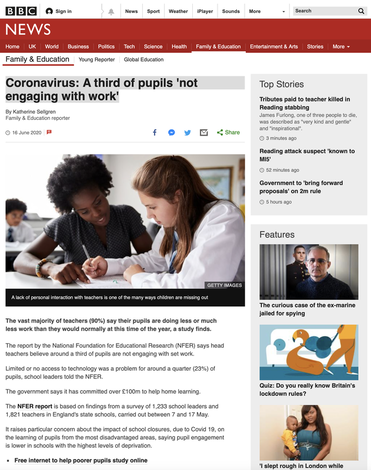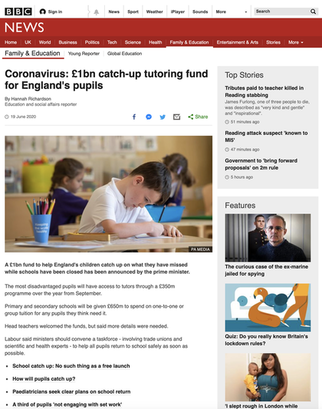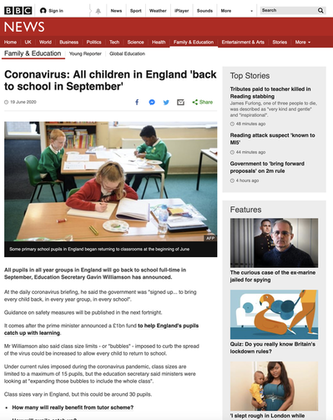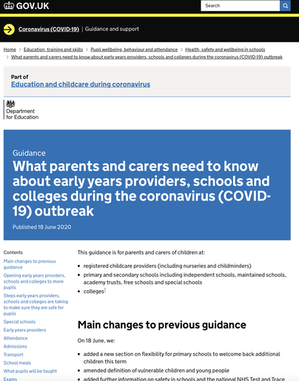|
by Douglas Silas, specialist SEN solicitor Here is my update for this week. Again this week I am setting out only part of the text of this week’s update for those of you reading this update by email, to try to make it a bit easier for people to read things and then only need to click on links which are of interest to them. (Again, anyone receiving this update through Social Media will be reading the full update as normal after clicking on the link). I hope that this helps people again. 1. What has happened this week? It’s no surprise if you have already guessed again from the title of this week’s update, what the issue was again this week in SEN news –schools going back again! The beginning of the week saw an article on the BBC’s website entitled: ‘Coronavirus: A third of pupils 'not engaging with work', which said: “The vast majority of teachers (90%) say their pupils are doing less or much less work than they would normally at this time of the year, a study finds. The report by the National Foundation for Educational Research (NFER) says head teachers believe around a third of pupils are not engaging with set work. Limited or no access to technology was a problem for around a quarter (23%) of pupils, school leaders told the NFER. The government says it has committed over £100m to help home learning. The NFER report is based on findings from a survey of 1,233 school leaders and 1,821 teachers in England's state schools, carried out between 7 and 17 May. It raises particular concern about the impact of school closures, due to Covid 19, on the learning of pupils from the most disadvantaged areas, saying pupil engagement is lower in schools with the highest levels of deprivation. Secondary schools with the highest number of children eligible for free school meals reported that 48% of pupils were engaged with learning activities, compared with 66% and 77% of pupils at schools in the middle and lowest brackets. Teachers told researchers the following pupils were finding it particularly difficult to engage in remote learning, compared to their peers: - those with limited access to technology and/or study space - vulnerable children - those with special educational needs and disabilities - and young carers. Teachers say just over half (55%) of their pupils' parents are engaged with their children's home learning, according to the report. But teachers from the most deprived schools report a lower parental engagement, at 41%, than those from the least deprived schools, at 62%. NFER chief executive Carole Willis said: "There are considerable differences in the levels of pupil engagement in remote learning, particularly amongst the most disadvantaged pupils." There is a risk that the attainment gap will widen as a result of the pandemic, she added, calling for a "comprehensive and long-term plan to address this issue". Josh Hillman, director of education at the Nuffield Foundation, which funded the research, said: "The shift to remote learning during lockdown has made the implications of children and young people's unequal access to IT equipment and connectivity even more stark." Geoff Barton, general secretary of the heads' union ASCL, backed a national plan "to help these children to catch up". "This analysis shows that children who already face the greatest challenges have suffered the worst impact to their learning during the lockdown, and that the digital divide is largely to blame." A Department for Education spokeswoman said: "We will do whatever we can to make sure no child, whatever their background, falls behind as a result of coronavirus. "We are also considering, with a range of partner organisations, what more is required to support all pupils who have been affected by school closures." The NFER study comes as a research paper from University College London's Institute of Education finds pupils across the UK are studying for an average of 2.5 hours a day during lockdown. This figure is about half that indicated by a previous survey by the Institute for Fiscal Studies, suggesting that learning losses could be much greater than previously thought. The UCL research, which examined data from a UK household longitudinal study covering 4,559 children, says one fifth of pupils (around two million children in the UK) did no schoolwork or less than an hour a day at home, while 17% put in more than four hours a day. It finds that the variability in the amount of schoolwork being done at home is adding to existing regional and socioeconomic inequalities, with pupils in London, the South East of England and Northern Ireland receiving more offline schoolwork, such as assignments, worksheets and watching videos, than elsewhere in the UK. In the South East, for example, 28% of children were receiving four or more pieces of offline schoolwork per day, compared with the countrywide average of 20%. The report also says children eligible for free school meals "appear to be additionally disadvantaged during lockdown", with 15% receiving four or more pieces of offline schoolwork compared with 21% of children not eligible for free meals. Prof Francis Green, who led the research, said it "painted a gloomy picture of lost schooling and low amounts of schoolwork at home". "The closure of schools, and their only-partial re-opening, constitute a potential threat to the educational development of a generation of children. "Everyone is losing out in this generation, some much more than others. "Better home schoolwork provision, and better still an early safe return to school for as many as possible, should now become a top priority for government." By mid-week though, the BBC’s website published another article entitled: ‘£1bn catch-up tutoring fund for England's pupils’, which said: “A £1bn fund to help England's children catch up on what they have missed while schools have been closed has been announced by the prime minister. The most disadvantaged pupils will have access to tutors through a £350m programme over the year from September. Primary and secondary schools will be given £650m to spend on one-to-one or group tuition for any pupils they think need it. Head teachers welcomed the funds, but said more details were needed. Labour said ministers should convene a taskforce - involving trade unions and scientific and health experts - to help all pupils return to school safely as soon as possible. Shadow education secretary Rebecca Long Bailey said the plans "lack detail and appear to be a tiny fraction of the support" needed and called for a "detailed national education plan to get children's education and health back on track". However, Boris Johnson said the fund would help head teachers provide what pupils need. He thanked teachers, childcare workers and support staff for their efforts during the pandemic, and said he was "determined to do everything" he could to get all children back in school from September. Boris Johnson: “We have got to start thinking of a world in which we are less apprehensive." "We will bring forward plans on how this will happen as soon as possible," he said. And during a visit to a school on Friday, Mr Johnson suggested there may be change in the rules on social distancing, with more guidance due "very, very shortly", adding: "Watch this space." It comes as the Covid-19 alert level has been downgraded, bringing with it a possible relaxation of the rules that have kept many pupils out of school. The Scottish Government said it is also looking at social distancing rules in schools, after Northern Ireland decided to reduce its two-metre rule to one metre. Nicola Sturgeon has said she wanted schools to open safely as soon as possible. The announcement comes a week after Mr Johnson said the government was planning "a huge amount of catch up for pupils over the summer". But the announcement did not include any specific push towards catch-up activities running through the summer break except an expectation that usual summer clubs would be running. Instead there is a strong push for head teachers to target catch-up help via tutoring from September. However, schools minister Nick Gibb told the BBC there was lee-way for heads to set up summer schemes if they so wished. But he said: "If you want children to catch up, it can't just be done over the month of August - it has to be longer term over the academic year". Research by the Institute for Fiscal Studies (IFS) suggests the £650m pot represents about £80 extra for each student. That is a rise of about 1% but would leave total spending still 3% below 2010 levels in real terms. Early years providers and colleges for 16 to 19-year-olds are not included in the plans. Bill Watkin, chief executive of the Sixth Form Colleges Association, said it would be "entirely unjustifiable" to exclude sixth form students from the package. Neil Leitch, chief executive of the Early Years Alliance, said the government's decision not to include pre-schoolers "beggars belief". But Mr Gibb said that older age groups had "fared better with remote education than other age groups" which is why the government was focused on helping younger pupils. Schools were shut across the UK on 20 March. Apart from the children of key workers, most children have not been to school since then and will not enter a classroom until after the summer holidays. Children in nursery, Reception, Year 1 and Year 6 have begun returning to primary schools in England, and some Year 10 and 12 pupils returned to secondary schools and colleges this week. Schools in Wales are reopening at the end of June, with only a third of pupils in class at any time, while in Scotland, schools are preparing to reopen on 11 August. Social distancing in schools has been halved to 1m (just over 3ft) in Northern Ireland, where ministers are aiming for a full reopening of schools on 24 August. However, head teachers have warned that parts of the Northern Ireland plan are "unrealistic and undeliverable". Plans for the subsidised National Tutoring Programme have been developed with a group of social mobility organisations and academics led by the charity Education Endowment Fund (EEF). The EEF has said that until now, access to tutoring has been the preserve of wealthy families - but this would no longer be the case as schools would be able to seek subsidised tutoring. However, individual schools would be expected to pay 25% of the tutoring costs in the first year, or from their share of the £650m in extra funding being made available to them as part of this package. The tutors themselves will be provided by organisations approved by the National Tutoring Programme. Many of them will be students or graduates trained by tutoring groups. Their modelling suggests between 550,000 and 650,000 courses, featuring three pupils to one tutor, would run for an hour a week over 15 weeks. "Tutoring is the catch-up approach supported by the strongest evidence," said the EEF's chief executive, Prof Becky Francis. She said the programme hoped to reach more than a million pupils, calling it a tremendous opportunity to create long-lasting change. Association of School and College Leaders general secretary Geoff Barton welcomed the investment, saying it would help support the work schools are already undertaking on pupil catch-up. But he noted that the investment was expected to be spent on tutoring, rather than being left to head teachers to decide. "As ever, we suspect the devil will be in the detail and we await further information," he said. He was also concerned that there was no investment for sixth forms. David Hughes, chief executive of the Association of Colleges, criticised the decision not to include colleges for 16 to 19-year-olds in the plans. He said teenage college students deserved as much catch-up support as every other age group and it was "indefensible" to overlook them. National Association of Head Teachers general secretary Paul Whiteman said he was pleased ministers had listened to calls for a longer-term response, rather than short-term fixes. "This is a considerable sum of money," said Mr Whiteman, but he also warned there were many details still to be worked through.” By the end of the week though, another article appeared entitled: ‘Coronavirus: All children in England 'back to school in September', which said: “All pupils in all year groups in England will go back to school full-time in September, Education Secretary Gavin Williamson has announced. At the daily coronavirus briefing, he said the government was "signed up... to bring every child back, in every year group, in every school". Guidance on safety measures will be published in the next fortnight. It comes after the prime minister announced a £1bn fund to help England's pupils catch up with learning. Mr Williamson also said class size limits - or "bubbles" - imposed to curb the spread of the virus could be increased to allow every child to return to school. Under current rules imposed during the coronavirus pandemic, class sizes are limited to a maximum of 15 pupils, but the education secretary said ministers were looking at "expanding those bubbles to include the whole class". Class sizes vary in England, but this could be around 30 pupils. Teachers' unions say the proposals have not been thought through. "There is no social distancing if you've got 30 children in one classroom," Kevin Courtney, joint general secretary of the National Education Union (NEU), told the BBC. "But then you're going to ask them to abide by social distancing when they go out, I think that won't work and that will mean children aren't looking at social distancing at all." Schools closed to everyone except vulnerable children and those with a parent identified as a key worker on 20 March, in response to the pandemic. As the lockdown measures started easing at the beginning of this month, children in nursery, reception, Year 1 and Year 6 were encouraged to return to primary schools in England, albeit in smaller class sizes. Some Year 10 and 12 pupils - selected because they are sitting GCSEs and A-levels respectively next summer - returned to secondary schools and colleges this week. Ministers now want all pupils in England to return to classrooms full-time in the autumn, ending a near six-month absence for many pupils. "We have already been very clear that we want to see all children in all classes returning full-time to school in September. That's what we are working towards," Mr Williamson told reporters. It is a promise that many parents will have been waiting to hear. Education Secretary Gavin Williamson has committed to all school pupils in all year groups going back full-time in September. The part-time, online, often not-really-anytime lessons will be over. But the much trickier question will be how to deliver this. Even if social distancing is reduced - and class size "bubbles" of 15 pupils can be increased - there will still be massive logistical challenges. Head teachers have warned any social distancing, even 1m, will require additional classrooms and teachers. And they have been exasperated at time ticking away without any clear plan - with heads' leader Geoff Barton complaining schools are working in an "information black hole". When the government had to U-turn on bringing back all primary pupils it was because nobody listened to similar warnings about lack of space. But a September deadline is now in place - and there will be high political stakes if there is another failure to deliver. The education secretary said signs that the spread of coronavirus was reducing meant that ministers could now look at "making sure that every child returns to school". He said he understood "there is anxiety still among parents" about their children going back to school, but stressed: "I want to assure you that the well-being of your children is the absolute top priority for every single one of us." The government will publish guidance for schools within the next two weeks on how to bring children back "so that schools have the maximum amount of time to prepare for the next phase", Mr Williamson said. However, there was no confirmation of whether the government's 2m social distancing rule was going to be relaxed in schools. Mr Williamson reiterated that a review of the measure is under way, and added that could not provide an exact date for a decision. Current Department for Education (DfE) guidance states that primary school classes should be split in half and contain no fewer than 15 pupils, desks should be spaced as far apart as possible and lunch, break, drop-off and pick-up times should be staggered. Schools should also consider introducing one-way circulation, or placing a divider down the middle of the corridor, to keep young people apart, it adds. Mr Williamson was speaking after the coronavirus alert level for the UK was downgraded from four to three, paving the way for a "gradual relaxation of restrictions". At level four, transmission of the virus was thought to be "high or rising exponentially"; at three, it is thought be "in general circulation". Earlier, Prime Minister Boris Johnson said he was "determined to do everything" he could to get all children back in school from September. "We will bring forward plans on how this will happen as soon as possible," he said. The prime minister's pledge prompted teachers' unions to call for further clarity on the proposals. Geoff Barton, general secretary of the Association of School and College Leaders (ASCL), said schools and colleges were trying to prepare for September amid an "information black hole" from the government. Mr Barton said school and college leaders were preparing for two scenarios for the autumn - using rotas to stagger the return of pupils or bringing students back full-time - amid an "absence of information". Paul Whiteman, general secretary of school leaders' union NAHT, said: "The desire to bring everyone back is correct but we need to know what the government is thinking and the scenarios they are planning for. "This will give school communities what they need to get through this term and plan for the new academic year in September." Mr Courtney, of the NEU, said earlier: "The prime minister's hopes are not enough." "If the requirements of social distancing - in order to stop a second peak - are reduced even to 1m, then most schools could not have 30 children in a classroom," he added.” And so you also know, the Government issued guidance this week entitled: ‘What parents and carers need to know about early years providers, schools and colleges during the coronavirus (COVID-19) outbreak’, which says: “This guidance is for parents and carers of children at: - registered childcare providers (including nurseries and childminders) - primary and secondary schools including independent schools, maintained schools, academy trusts, free schools and special schools - colleges Main changes to previous guidance On 18 June, we: - added a new section on flexibility for primary schools to welcome back additional children this term - amended definition of vulnerable children and young people - added further information on safety in schools and the national NHS Test and Trace programmupdated content 30 hours free childcare and/or tax-free childcare - updated content on transport which includes information on using face masks on transport - revised section on school meals, adding more information on the reopening of school kitchens as well as meals in colleges - updated content on exams in 2021” 2. What does this mean? I’m not sure really! Extra money for education is always a good thing, but the devil is always in the detail they say. Let’s hope this is not just a knee-jerk reaction and there is now sufficient time to sort this out carefully and properly. 3. Where can I find further information?
There isn't really much more that I can say again in this update now. However, as I always like to do at the end of my updates, I would again remind you of the very useful resources and information provided on the following websites: - IPSEA - Council for Disabled Children - Contact - Scope - Special Needs Jungle I would also highlight again the fact that you can now get digital copies of the magazines: SEN Magazine and Autism Eye which are both very helpful to any parents or professionals involved with children/young people with SEN. Keep safe until next week. With best wishes Douglas P.S I understand that there are a number of educational or other useful resources now on the web - I would be very grateful if you could let me know of any that people are finding useful, so that I can direct others to them. P.P.S. I also want to highlight again the fact that there are currently a lot of scams out there, both online and through texts/WhatsApps. Please be extremely careful and help yourself and others not to become victims. You can learn more at: www.FriendsAgainstScams.org.uk. |
Archive
March 2022
|
© Douglas Silas Solicitors 2005-24
Authorised and Regulated by the Solicitors Regulation Authority (SRA no: 643718)
‘Douglas Silas Solicitors’ is the trading name of ‘Douglas Silas Solicitors Limited’, a limited company registered in England & Wales (company no: 10689991), whose registered office is Gable House, 239 Regents Park Road, Finchley, London, United Kingdom, N3 3LF. A list of members/directors may be inspected at our office.
Authorised and Regulated by the Solicitors Regulation Authority (SRA no: 643718)
‘Douglas Silas Solicitors’ is the trading name of ‘Douglas Silas Solicitors Limited’, a limited company registered in England & Wales (company no: 10689991), whose registered office is Gable House, 239 Regents Park Road, Finchley, London, United Kingdom, N3 3LF. A list of members/directors may be inspected at our office.






 RSS Feed
RSS Feed







